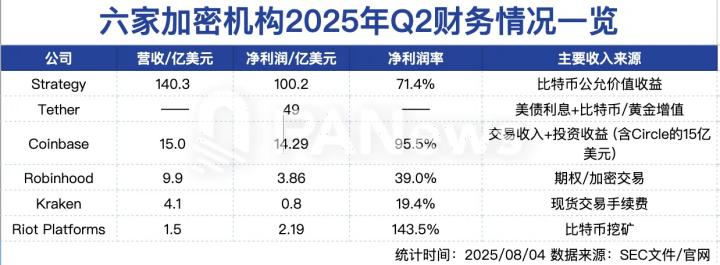On August 1st, Coinbase, the largest cryptocurrency exchange platform in the United States, disclosed in its Q2 financial report that its overall performance this quarter included a net profit of $1.43 billion, far exceeding the $36 million from the same period last year. Total trading volume was $237 billion, slightly increasing from $226 billion in the same period of 2024. Compared to the previous quarter, trading revenue decreased by 39%, and spot trading volume reduced by over 30%. Notably, the previously exposed user data breach ultimately resulted in a loss of $307 million.

After the financial report was published, market data showed that its stock price dropped over 9% after hours to $377.7, and continued to decline in the following days, reaching as low as $314.
Spot Trading Volume Significantly Declined, BTC Holdings Exceed 11,000 Coins
Coinbase's latest financial report shows that Q2 total revenue was $1.5 billion, with a year-on-year increase but falling short of analysts' expectations of $1.59 billion. Net profit was $1.4 billion, primarily including $1.5 billion in unrealized gains from strategic investments and $362 million in unrealized gains from crypto assets. Excluding these impacts, adjusted net profit was $33 million.
In terms of revenue sources, Coinbase primarily has three income streams: trading revenue, subscription revenue, and others.
Trading revenue was $764 million, a year-on-year decline of 39%, significantly below market expectations. Overall trading volume decreased by 40% quarter-on-quarter, with retail declining 45% and institutional declining 38%. Retail trading revenue was $650 million (trading volume of $43 billion), institutional trading revenue was $60.8 million (trading volume of $194 billion), with other trading revenue at $54 million. Trading users decreased by 1 million quarter-on-quarter, falling to 8.7 million. However, this was mainly due to user panic, with average trading volume per user dropping 38%.

Subscription and service revenue: $656 million, a quarter-on-quarter decline of 6%. Stablecoin revenue (mainly USDC) was $333 million (a quarter-on-quarter increase of 12%), with an average USDC balance of $13.8 billion on the platform and $47.4 billion off-platform.
Staking rewards were $145 million (a quarter-on-quarter decline of 26%), interest and financial fee income was $59.3 million (a quarter-on-quarter decline of 6%), and other subscription and service revenue was $120 million (a quarter-on-quarter decline of 15%).
As of the end of the second quarter, Coinbase had $9.3 billion in USD resources, a decrease of $590 million from the previous quarter, down 6%. This decline was primarily due to increased fiat currency loan disbursements and crypto asset portfolio purchases. Cash and cash equivalents were $1.449 billion, USDC (net) was $1.784 billion, money market funds were $5.98 billion, and cash deposited on third-party platforms was $110 million.

The official tweet showed that Coinbase purchased 2,509 BTC in the second quarter, with total BTC holdings of 11,776 coins, at a total cost of $740 million, currently valued at $1.26 billion.
Aggressive Acquisitions, Diversified Business Progressing
As a US-listed exchange, its current product line includes Coinbase main platform, Coinbase Pro (now Coinbase Advanced), Coinbase Wallet, Coinbase Card, Coinbase Earn, Coinbase Cloud, covering retail and institutional users, trading and custody, DeFi and payment sectors.
Moreover, Coinbase has recently intensified its acquisition efforts, expanding into multiple domains. On July 29th, Bloomberg reported that Coinbase was in advanced negotiations to acquire Indian crypto trading platform CoinDCX. However, CoinDCX CEO Sumit Gupta quickly denied this, stating the company would not be sold.
On July 11th, Coinbase completed a talent acquisition, specifically of Opyn CEO Andrew Leone and Research Director Joe Clark. Leone and Clark will now join the Onchain Markets team, operating within Coinbase's institutional organization, focusing on verified pool development and other on-chain market product plans.
The largest acquisition occurred in May, when Coinbase officially confirmed the acquisition of crypto options platform Deribit to unify spot, futures, and options trading. The acquisition price was approximately $2.9 billion, including $700 million in cash and 11 million Coinbase Class A common shares. This further strengthens its options and derivatives market layout. Recently, it also acquired Liquifi (a token management platform), expanding its asset management and token issuance capabilities.
Additionally, Coinbase has partnered with traditional financial institutions like JPMorgan Chase, PNC Bank, and American Express to advance services such as user deposits and USDC reward point exchanges.
Coinbase's financial report shows that Base is one of the largest USDC distribution networks, with most P2P transactions on Base completed through USDC. The Base APP is currently in public beta, with integrated functions including wallet, trading, payment, social, gaming, and DApp. The latest data from growthepie shows its active address count far exceeds OP and Arbitrum.

On the policy compliance front, after the US SEC withdrew its lawsuit in February, Coinbase obtained a MiCA license in Luxembourg in June, authorizing core retail and institutional services in 30 European Economic Area member states, paving the way for entering the European market.
Future Bets on Prediction Markets, Tokenized Stocks
Coinbase's ambitions will continue to span multiple domains.
Today, Coinbase Product VP Max Branzburg revealed to CNBC that Coinbase is about to expand its service range for US users, creating an "all-in-one trading platform" that includes tokenized stocks, prediction markets, early token sales, and other businesses. The official Coinbase tweet's video also echoed this perspective.

However, in the prediction markets sector, Coinbase will face competition from Kalshi, currently the only federally licensed prediction market platform in the US, and the global leader Polymarket—which plans to re-enter the US market after recently acquiring the licensed derivatives trading platform QCEX.
Furthermore, Coinbase's tokenized stock product will compete with similar products from Robinhood, Gemini, and Kraken, though these companies' products are currently only open to investors outside the US.
Click to learn about BlockBeats job openings
Welcome to join the official BlockBeats community:
Telegram Subscription Group: https://t.me/theblockbeats
Telegram Discussion Group: https://t.me/BlockBeats_App
Twitter Official Account: https://twitter.com/BlockBeatsAsia






